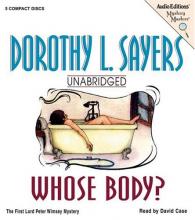inspiration + perspiration = invention :: T. Edison ::

I've often wondered how Lord Goring of Wilde's An Ideal Husband would work as a detective, with his razor sharp wit, love of frivolity, and hidden depths of wisdom. Turns out someone's already written a tale encompassing such a character. In this first Lord Peter Wimsey novel, author Dorothy L. Sayers drew from the best of previous detective fiction while making the genre all her own. Whimsey's a smart dandy, a foolish genius, an adult who realizes that childlike wonder is nothing to be ashamed of, and he's a positive joy to read about.
Originally published in 1923, Whose Body? introduced the Duke's son turned sleuth in a mad dash out his fashionable apartment on a most important errand: not to stop a criminal, but to beat the competition to auction for a rare manuscript. As soon as his mother telephones to inform him of a murder, though, he immediately takes up the case. A body's been discovered in the bathtub of an architect, another body with a similar description goes missing, and Whimsey can barely contain his glee as he dazzles with his deductions while spouting pithy quotations and musical lyrics.
There's a lot of debate amongst mystery fans regarding so-called "cozy" mysteries, and on first glance this one might be accussed of enjoying itself too much. But Whimsey, however charmingly indolent he appears, is not simply the comic aristocrat he would have others believe him to be, nor is his world some idealized bygone setting. Sayers fully embraced the complexities of a post-World War I England, using satire and dry irony to point out the times' idiosyncrasies with barbs that still resonate today. When Whimsey speaks of how cold-blooded a murderer is, he may sound like he's poking fun, but it's a humor forged in the crucible of trench warfare when he saw exactly what drove men to kill each other.
I alluded to Wilde earlier, and there's certainly a strong sense of his style in Sayers's. Whimsey could be a relation of Lord Goring (described by Wilde as "the first well-dressed philosopher in the history of thought"), and he can get carried away by his own cleverness in the same charming manner. But he's grounded by a wonderful supporting cast of characters. These include his trusty butler Bunter, a man I'm sure Batman's Alfred is based on and who manages to embody an archetype while not being consumed by it. Whimsey's mother, the Dowager Duchess, is great fun: she manages to be everything proper while being fully independent when she believes herself in the right.
No British detective story could be complete without a nod to Scotland Yard, and Whimsey has two detectives he's familiar with. One, Inspector Sugg, bristles at the very idea of an amateur enthusiast assisting on the case. The other, Inspector Parker, is a friend and ally who's no slouch himself at detection, and provides a necessary spark to get Whimsey back on track. I appreciated that the official force was not treated as idiotic but rather overburdened.
Finally, I listened to an audiobook version of this novel narrated by the delightful David Case. He gave each character a unique tone and manner, including the dryly observant narrator. The MP3 files I downloaded unfortunately had a few skips here and there; however, Case's work is brilliant, and I encourage even long-time fans to give it a listen.
Fans of murder and mayhem will certainly enjoy this book. After two listens I realized just how much substance lies underneath the gloss glib manner its presented in. The dialogue sparkles like fine wine and the case is bizarre enough to keep the reader guessing to the end. I very much look forward to revisiting Lord Peter Whimsey and his crew again.
This review is also posted on Goodreads and Amazon. I did not receive anything from the publisher or author for this review. The cover was illustrated by Cathie Bleck. The book is currently available from HarperCollins as a Paperback ($14.99) and via Amazon as an eBook ($0.99).





